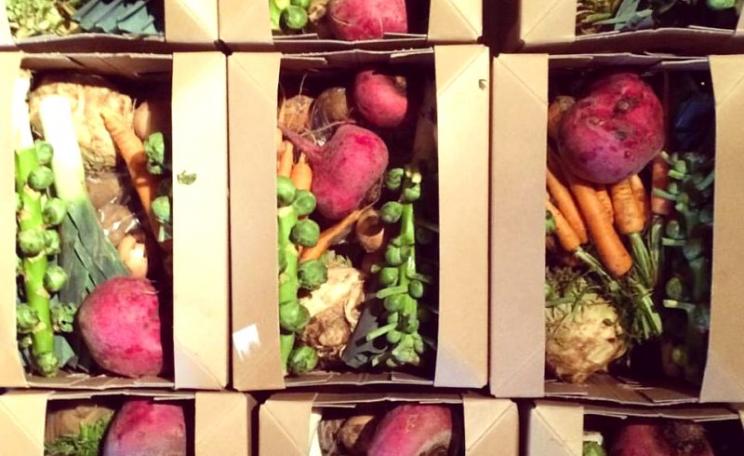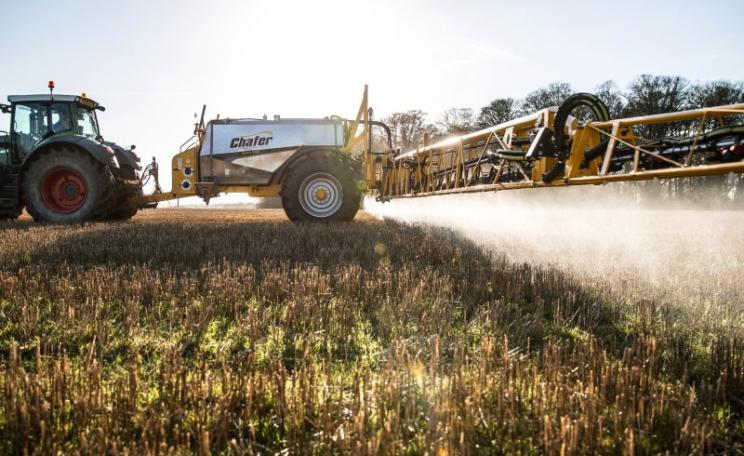The glyphosate pre-harvest spraying season starts now, and in the interests of human health and the quality of British bread, the government needs to call an immediate halt to it now!
Spraying weed killer on food crops to kill them so they can be harvested faster - it sounds ridiculous!
But it's happening all across the UK on the wheat that makes our bread, flour, cake pasta and biscuits.
It gets worse. The weed killer in question, glyphosate, was recently classified by the World Health Organisation's IARC (International Agency for Research on Cancer) as probably carcinogenic to humans. And new data analysis shows it's appearing more and more frequently in our bread.
Glyphosate is the world's most widely sold weed killer - you might know it as the active ingredient in Monsanto's Roundup herbicide - used in farming, in public places like parks, streets and schools and also by people in their back gardens.
Many farmers routinely use Roundup and other herbicides to clear their fields of weeds before crops emerge in the spring. But what's more alarming is that farmers also use herbicide on crops shortly before they are harvested, in order to 'dessicate' the plants - that's dry them out - and make them easier to harvest.
Some glyphosate with your bread, madam?
Glyphosate-based herbicides are among those that can be used as pre-harvest herbicides or 'dessicants'. For example, Monsanto's 'Roundup with MAPP Number 12645' is licenced for use on wheat, barley, oats, durum wheat, combining pea and field bean, just seven days before harvest. It can also be used on oilseed rape and linseed 14 days before harvest and on mustard crops eight days before harvest.
The aim is to kill any parts of the crop that haven't ripened evenly so combine harvesters can move more quickly and cover more ground during harvest. It also means that the seeds tend to be drier at harvest, which may reduce drying costs.
So maybe it's not such a surprise that glyphosate is one of the three pesticides regularly found in routine testing of British bread - appearing in up to around 30% of samples tested by the Defra committee on Pesticide Residues in Food (PRiF).
Figures analysed by the Soil Association from government data show glyphosate use in UK farming has increased by 400% in the last 20 years. A recent European study on city dwellers found that in the UK, 7 out of 10 people had traces of glyphosate in their urine.
Roundup may be 1,000 times more toxic than glyphosate itself
The food industry claims the level of glyphosate in food poses no danger to the British public. But the WHO findings and the chemical cocktail often found in bread sold in the UK call this into serious question.
Unlike other reviews, IARC panel looked at what farmers are actually using. Farmers never use glyphosate alone - they use a 'formulation' or mixture like Roundup that includes other chemicals to do things like make the weed killer stick to the crop, and not wash off in the first shower of rain.
The glyphosate pre-harvest spraying season starts now, and in the interests of human health and the quality of British bread, the government needs to call an immediate halt to it now!
The research the IARC looked at included data on the impact of commercially available glyphosate-based herbicides, like Roundup, to determine that it is "probably carcinogenic to humans". Also, IARC only takes into account published, peer reviewed data and scientific studies.
The pesticide regulators in Europe and elsewhere only look at scientific data about glyphosate on its own - and often place faith in unpublished industry studies that aren't publicly available and have never passed peer review or been exposed to expert critique.
The amount of glyphosate in bread sits well below the level deemed unsafe by the EU but this level has not been revised since the WHO's 'probable carcinogen' ruling.
In addition, the accepted levels for glyphosate residues have always been a matter of controversy - if glyphosate is an endocrine disrupter, as some scientists suggest, there is no safe lower level for human consumption.
We should not have to 'go organic' to avoid eating weed killer
Unless people are eating organic food exclusively, it's almost impossible to avoid ingesting this potentially dangerous chemical.
However, farmers could responsibly choose not to use glyphosate as a pre-harvest spray on wheat crops. And in fact, the industry funded Agriculture and Horticulture Development Board's advice to farmers indicates that using glyphosate pre-harvest is often a bad idea in the first place:
"Trials in England and Scotland showed no advantage - in terms of grain and straw moisture content, harvest efficiency or grain quality - where weed-free wheat crops were treated", the company warns.
"Serious yield losses can occur when much of the grain is well above 30% moisture content", the advice continues. "This highlights the potential risk of using pre-harvest glyphosate to 'even up' harvesting. Residues are likely to be higher if glyphosate is applied to such moist grain."
But the fact that glyphosate is regularly found in bread suggests that some farmers are applying the chemical in ways that allow it to enter the food chain. This is why the Soil Association is calling for an immediate end to the use of these sprays on wheat destined for use in bread - a call made at a scientific briefing we held on this last week.
The call was backed by a panel at the briefing that included Professor Christopher Portier, a co-author of the IARC report, Dr Robin Mesnage of the Department of Medical and Molecular Genetics at Kings College in London, and Claire Robinson, editor of GMWatch.org.
Revise glyphosate herbicide licences now!
The chemical industry has accused the WHO of classifying glyphosate as a probable carcinogen along with things like coffee and bacon. This is rubbish for two reasons.
Firstly, the IARC has a number of categories for classification. Coffee appears in category 2B, 'possible carcinogen', meaning there is limited evidence in humans and less than sufficient evidence in animals.
But glyphosate is in category 2A - the same category as human papillomavirus type 68, inorganic lead compounds and dry cleaning fluid: there is limited evidence in humans and sufficient evidence in animals; there is strong enough evidence to conclude it probably causes cancer in humans.
Secondly, people can choose not to drink coffee or cook their bacon in a way that means it's safe to eat - the choice has been taken away from them when it comes to glyphosate. One expert at our scientific briefing remarked that glyphosate is literally everywhere in our food chain - throughout our water and food - there's no escape.
Outside the United Kingdom, the reaction to the WHO IARC report has been dramatic. Some retailers in Switzerland and Germany have removed glyphosate products from their shelves and France has committed to do so by 2018.
Meanwhile, German states are calling for an EU-wide ban, and the Danish Working Environment Authority has declared it as a carcinogen. El Salvador and Sri Lanka have banned it, and the Colombian government has banned aerial spraying on coca crops.
The glyphosate pre-harvest spraying season starts now, and in the interests of human health and the quality of British bread, the government needs to call an immediate halt to it now!
We can't rely on regulators alone to protect our health. The battle will be won by consumers insisting that their food doesn't contain glyphosate.
Sign our petition to tell bread manufacturers, including Hovis, Warburtons and Allied Bakery, that we don't want glyphosate in our bread.
Natasha Collins-Daniel is a campaigner at the Soil Association.







